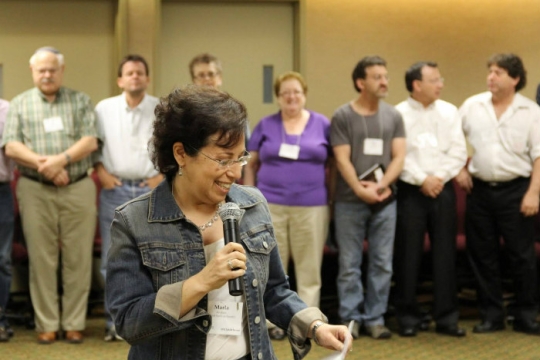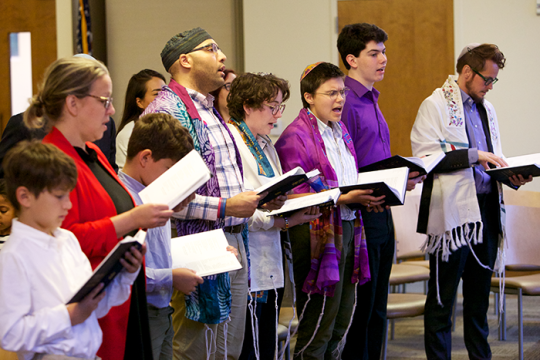
A demographic survey, like the Torah or any sacred text, needs interpretation. It's not obvious what conclusions we should be drawing from these surveys. They can not determine what the future will be but give us a snapshot of where we are. And they allow us to be strategic and smart about how we steer Jewish life.
Consider the 1990 Jewish Population Survey, which spawned the “Jewish continuity” effort. The big, dramatic headline was “Interfaith Marriage on the Rise.” Most people understood the rise of the intermarriage rate as signaling a mortal danger to the Jewish future. All kinds of initiatives were funded. All kinds of new responses were undertaken, but more than a decade earlier, URJ president Rabbi Alexander Schindler had already laid out the best response: Stop pushing interfaith couples away and instead embrace them.
This new Pew survey is another opportunity for Jewish leaders to consider what we might be doing differently, and what we should be doing exactly the same, and more of.
Sometimes we use Pew to prove what we already believe, just as, Jewish leaders might use biblical texts to cite verses with which they agree. Let's find the parts of the Pew survey that challenge us, that disrupt us, and that force us to see something we didn't see before and makes us think differently.
On Jewish Movements
So, here are few findings that confirm what we've known, and some that make us scratch our heads and say, “What does that mean?” The good news is that Pew confirms that Reform is the largest and most diverse movement in Jewish life -- larger than the Orthodox, Conservative, and the other movements combined.
But we must also pay attention to another Pew statistic: the large and growing category of Jews who do not identify with any particular branch of Judaism. The Reform slice is growing smaller among young adults in their twenties, thirties, and teens. That agitating finding should make us think a little bit differently about that journey ahead.
Pew also told us is that many of the numbers in 2020 are consistent with those of their 2013 study. The percentage of Reform Jews is up. The Orthodox community is roughly the same (9% today, 10% in 2013). One surprising 2020 finding is that Reform and Orthodox Judaism have the highest retention rates -- 67% of American raised as Orthodox continue to identify as Orthodox Jews as adults, and 66% of Reform Jews raised as Reform still identity as Reform today. It’s not obvious what that means, so as Jewish thought leaders, we’ll need to get inside this finding to determine how it might be useful in our strategic planning.
On Jewish Commitment
On the question of how Jews express their Jewish commitment, I want to send kudos to the Pew professionals. In the 2020 study, they sharpened their questions about the categories of religious observance. In the past, they were criticized for using Christian categories to measure Jewish observance. There is still room for improvement. If you ask how many Jews light Shabbat candles, you'll know something, but have no real insight into who is connecting, who is caring, and who is living their Jewishness every day.
On Social Justice
Those who say that social justice is not fundamental to Jewish life should look at Pew. It's not just a priority in our Reform Movement. Of the top things that American Jews say they are committed to, the largest number, 76%, is remembering the Holocaust, followed by leading an ethical moral life, and the third is working for justice and equality. You have to go way down to get to keeping kashrut and observance of Jewish law. I'm not judging that finding just highlighting it. I'm just saying social justice is at the heart of how most Jews in the US -- and I'm going to extrapolate to Canada as well -- think of their Jewishness.
On Antisemitism
Pew signaled a big rise in antisemitism, something we already know, but it also found that Jews say that Muslims and Blacks experienced discrimination in greater intensity and in greater percentages. That tells you about our Jewish community: It's not only about us. It's seeing some of the larger patterns as well.
On Israel
Pew found that 8 of 10 Jews say caring about Israel is important or essential to their Jewishness. That is pretty powerful. More than half view the former Israeli Prime Minister Benjamin Netanyahu negatively, with Reform Jews being particularly unsupportive of him. That's not a political judgment but rather a fact.
Reform Jews and all non-Orthodox Jews are optimistic about a two-state solution, but only one-third of Jews surveyed think the Israeli government is making a sincere effort towards peace.
I believe the big takeaway is that liberal Jews don’t care less but rather care differently about Israel, and that is something that also needs to be explored.
On American Politics
Pew pointed out some political difference between Orthodox and Reform Jews. 20% of Orthodox Jews identified as Democrat and 75% as Republican, while 80% of Reform Jews identified as Democrat and 18% as Republican. This finding suggests that what divides liberal and traditional Jews isn’t only the way we interpret Judaism but more fundamental questions of our core values.
One takeaway of these demographics is that we have to work harder to make sure that people with minority views in our movement feel affirmed, welcomed, and included in everything we do.
On Jewish Peoplehood
Jewish peoplehood has grown weaker according to this recent Pew survey. Orthodox and Reform Jews do not seem to have a lot in common. This is one of the meta-findings that should cause all Jewish leaders to consider better ways to strengthen the sense of mutual responsibility of all Jews. There are clearly so many things that divide us, which underscores the need in the coming years to intensify the ties that bind us together.
It’s heartening to see that in the recent wave of violent antisemitic attacks in North America that the wider Jewish community is standing together in genuine solidarity. And with a new government in Israel committed to healing rifts with World Jewry, we may see Israel more as a unifying force in Jewish life. So, as we seek to create a sense of larger peoplehood, we've got some very serious work to do in this realm.
Adapted from a May 25, 2021 Webinar with URJ President Rabbi Jacobs; Yolanda Savage-Narva, URJ director for Racial Equity, Diversity and Inclusion; Ari Kelman, Chancellor’s Leadership Professor of history at University of California Davis; and Amy Asin, URJ vice president and director of Strengthening Congregations.
Learn more about Pew Research Center Report: Jewish Americans in 2020 with Ari Kelman's piece "You Only Get Answers to the Questions You Ask" and "First Thoughts on the Latest Pew Research Center Study on Jewish Americans".
Related Posts

Why the Scheidt Seminar Is A Transformative Leadership Experience

Five URJ Pages to Bookmark Today

